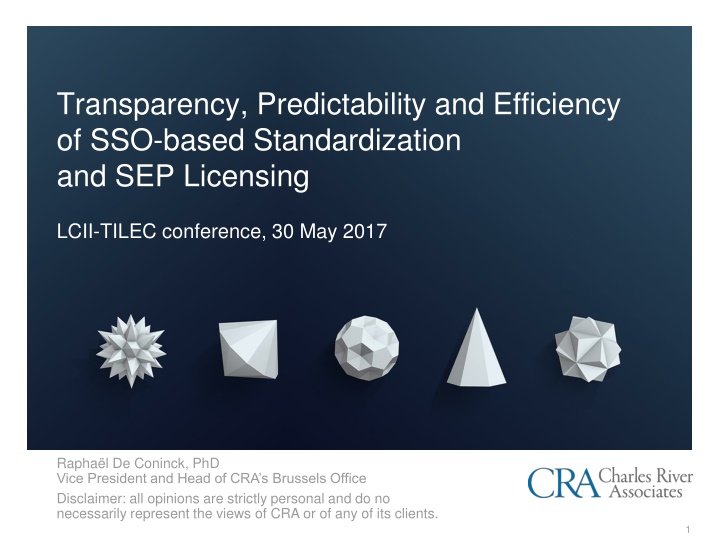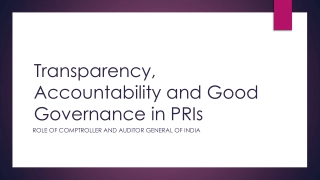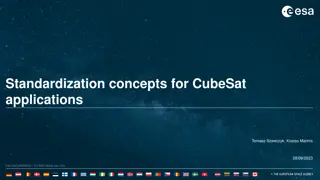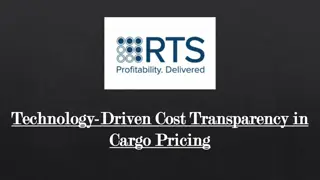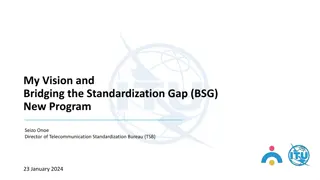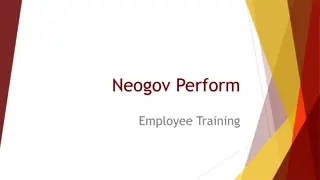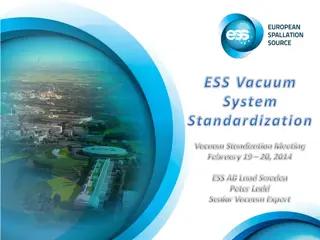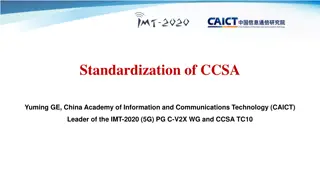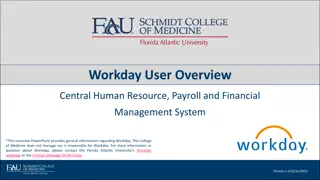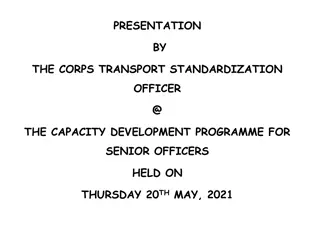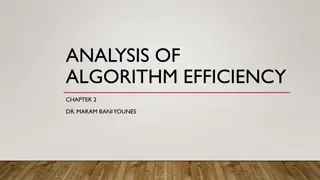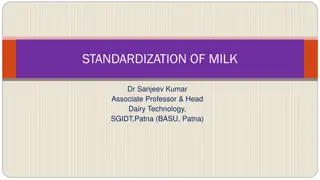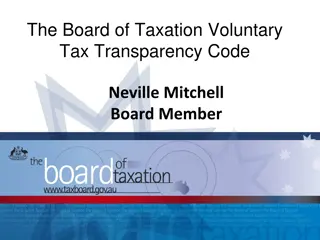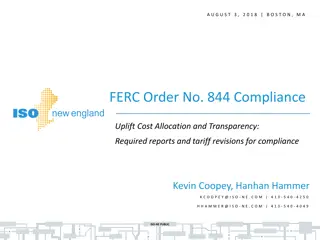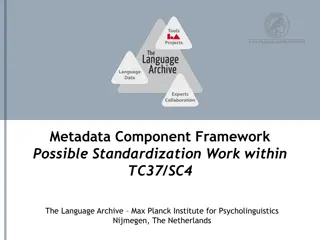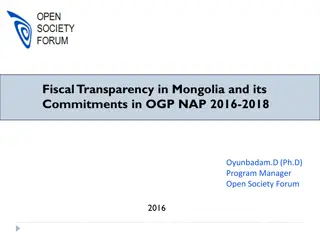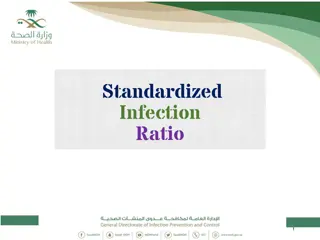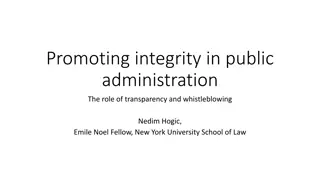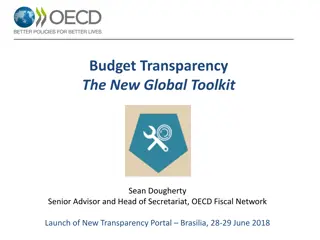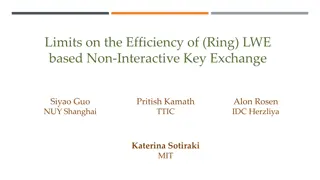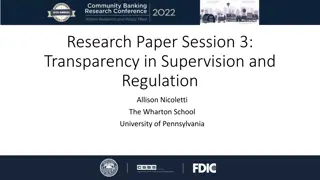Transparency and Efficiency in SSO-based Standardization
This presentation discusses the importance of transparency, predictability, and efficiency in SSO-based standardization and SEP licensing. Concrete proposals for improving the standardization process are highlighted, considering various stakeholder perspectives and industry complexities. The study aims to benefit all parties involved by proposing measures that enhance overall outcomes compared to the current status quo.
Download Presentation

Please find below an Image/Link to download the presentation.
The content on the website is provided AS IS for your information and personal use only. It may not be sold, licensed, or shared on other websites without obtaining consent from the author.If you encounter any issues during the download, it is possible that the publisher has removed the file from their server.
You are allowed to download the files provided on this website for personal or commercial use, subject to the condition that they are used lawfully. All files are the property of their respective owners.
The content on the website is provided AS IS for your information and personal use only. It may not be sold, licensed, or shared on other websites without obtaining consent from the author.
E N D
Presentation Transcript
Transparency, Predictability and Efficiency of SSO-based Standardization and SEP Licensing LCII-TILEC conference, 30 May 2017 Rapha l De Coninck, PhD Vice President and Head of CRA s Brussels Office Disclaimer: all opinions are strictly personal and do no necessarily represent the views of CRA or of any of its clients. 1
CRA study The CRA study makes concrete proposals for improving the efficiency of the standardization process and SEP licensing. The CRA study builds on comments and ideas that were gathered from a variety of stakeholders, and in particular: The consultation exercise organised by DG Growth before the launch of this research project, to which 40 stakeholders responded. A set of 36 hour-long interviews, and: A workshoporganised at CRA s Brussels offices, with participants representing 17 companies. Stakeholders included representatives from industry (ICT, Automotive, Machine Tools, ), SSOs, patent pools, academia, trade associations, patent offices and public authorities. Different points of views and interests of stakeholders (e.g. patent-holders versus implementers, whether the respondent is from a complex, patent- dense industry) taken into account for designing policy recommendations. Rapha l De Coninck 30/05/2017 2
The Spirit of the Study This is not about who should get the rents : try to propose a package of measures that overall makes all parties better off, not compared to their own preferred scenario but compared to the status quo. Preserving flexibility along dimensions where economic analysis is inconclusive and/or suggests that there is no one size fits all solution. Propose a package of measures but allow for different approaches in different industries. Guidance rather than formal obligations. Keeping things simple. Rapha l De Coninck 30/05/2017 3
Raphal De Coninck 30/05/2017 4
Expected stake-holder views (issues) Complex Industries Agreement? SEP-Holders Implementers Play down practical importance of these issues Insist on the need to recover large R&D investments. See unwilling licensees as a pervasive problem A problem but one that should be addressed collectively Favour a choice based on technical criteria only Emphasise the damage resulting from these issues Not a significant issues. Courts are well armed to deal with hold-out. NO Hold-Up and Ambush NO Reverse Hold-Up and Hold Out Same as SEP-owners YES, in principle. Royalty-Stacking Favour the introduction of economic considerations (i.e. best quality price ratio) NO Choice of Standard Favour reduction Favour reduction YES on overall reduction in transaction costs/uncertainty but opposing interests about the sharing of costs and benefits Transaction Costs Rapha l De Coninck 30/05/2017 5
Mapping Policies to Issues (Negative) Ex Ante Declaration + Frand Commitment Hold-Up Clarify Duties in Negotiation (Huawei) Hold-Out Ex Ante Commitment to / Indication of maximum Total Stack Stacking Transparency of Licensing Process Patent Pools Too many SEPs/ Essentiality PTO(?) Database and Essentiality Tests Royalty Base Level of Licensing Allocate total stack according to number of SEPs and average quality of portfolio Portfolio Licensing Licensing Practices Injunctions baseball-type arbitration Litigation Arbitration Rapha l De Coninck 30/05/2017 6
Considered Policy Options Commitments Disclosure Licensing Rapha l De Coninck 30/05/2017 7
Commitments FRAND Mean to address hold-up: hold-up may arise when there is no commitment on terms and conditions before the standard is set. FRAND constitutes an ex-ante commitment to limit ex-post market power. Conceptual definition: agreement that a given patent-holder and a given licensee would have struck if they had signed a licensing deal before any of the features of the standard were set. Since different licensees have different needs, possibility that an agreement would be reached ex-ante on different royalty and licensing conditions (but ND part of FRAND...) FRAND rates may be quite high for some portfolios: if some technologies are hard to design around, patent-owner may have considerable bargaining power, even ex-ante. Potential role for SSO? E.g. regarding specific clauses not being considered FRAND or arbitration related to FRAND. Rapha l De Coninck 30/05/2017 8
Commitments Royalty caps Royalty caps Ex-ante commitment on maximum royalty rate/conditions at which IPRs would be available if they happen to read on the chosen standard. Potential benefits: make it possible to consider possible trade-offs between technological excellence and economic efficiency. Individual caps Typically apply to entire portfolio of the declaring member. Reintroduce some form of ex-ante competition between technologies considered for a standard to alleviate hold-up issue. Aggregate caps Can alleviate both hold-up and royalty stacking. Alleviates hold-up if competition between standard-setting is a possibility. Directly addresses the stacking issue (coordinated pricing of strict complements may limit excessive pricing by individual licensors). Rapha l De Coninck 30/05/2017 9
Comparison of ex-ante and ex-post royalty stacks Rapha l De Coninck 30/05/2017 10
Disclosure Ex-ante disclosure Necessary complement to FRAND and royalty commitments (since IPRs to which such commitments apply need to be identified). Specific declaration: identifies all patents that patent-holder believes to be relevant for the standard to be designed. Negative declaration (linked to a commitment): patent holder only identifies patents not available at committed conditions (e.g. FRAND). Should aim at limiting transaction costs and addressing over-declaration. Ex-post disclosure Identification of patents that are deemed to read on the standard (necessarily specific). To lower uncertainty affecting the licensing process and transaction costs of licensing negotiations. External essentiality assessments can be a useful complement (e.g. random sampling). Rapha l De Coninck 30/05/2017 11
Licensing (1) Patent transfer rules Patent holder selling all or part of SEP portfolio to third parties, such as NPEs. General agreement that purchasers of portfolios should be bound by prior FRAND commitments (otherwise FRAND commitments not worth much). But should they be bound by the previous owner s interpretation of FRAND (i.e. can they charge more while claiming it is still respecting FRAND)? Transfer that goes against reasonably formed expectations may lead to additional hold-up issue. Rapha l De Coninck 30/05/2017 12
Licensing (2) Portfolio licensing Reduce transaction costs for both licensors and licensees. Combination of SEPs and non-SEPs (or cross licensing) to circumvent FRAND commitments? Not found to be a major issue by respondents. Issue does not arise as long as patent-holder makes a mixed bundling offer (i.e. there is also an offer on the SEP portfolio only). Patent Pools Patent pools typically charge a single overall royalty to licensees. Can address stacking + reduces transaction cost ( one-stop shopping). In practice, limited: need agreement on the sharing rule and royalty level, diverging interest of patent-holders (some of which may also be implementers) plus set-up costs. SSO can encourage voluntary formation of patent pools (e.g. by appointing a pool management company early). Rapha l De Coninck 30/05/2017 13
Licensing (3) The royalty base A first principle is that a given total payment can be expressed in terms of a broad base (with a low rate) or with a narrow base (with a high rate). Second principle: the base should be closely related to the part of the final good s value which is affected by the technology included in the SEP. Efficient choice of the base depends on the characteristics of the technology (e.g. smartphones versus cars), and hence it makes little sense to mandate a single type of royalty base (such as the smallest tradable unit or total value of the good). Vertical level of licensing First principle: does upstream licensing significantly affect the ability to discriminate across fields of use (e.g. if chips used are similar across applications)? Second principle: minimizing transaction costs (e.g. less costly to negotiate upstream if more concentrated). Rapha l De Coninck 30/05/2017 14
Licensing (4) SSO policies on dispute resolution Courts are last resort to put content into FRAND and determine whether commitments have been honored. Courts are building and clarifying over time their approach for solving FRAND disputes. Mixed views on making alternate dispute resolution (arbitration and mediation) mandatory: many fear of being deprived of legal rights to go to court, and highlight that courts are better placed to rule on infringement and validity. There is however a role for encouraging arbitration/mediation regarding simpler disputes on the level of royalties. Such dispute resolution must then be properly designed (e.g. high-low versus baseball or night baseball mechanisms). Plus value in having the decisions published. Rapha l De Coninck 30/05/2017 15
Illustration of proposed policies Rapha l De Coninck 30/05/2017 16
Reference Transparency, Predictability and Efficiency of SSO-based Standardization and SEP Licensing, A Report for the European Commission, prepared by Pierre R gibeau, Rapha l De Coninck and Hans Zenger, June 2016 (published on 12 December 2016 on DG GROW's website). Rapha l De Coninck 30/05/2017 17
Raphal De Coninck rdeconinck@crai.com Tel +32 (0)2 627 1401 +32 (0)492 738010 Brussels Tel +32 (0)2 627 1400 143 Avenue Louise B-1050 Brussels Belgium London Tel +44 (0)20 7664 3700 99 Bishopsgate London EC2M 3XD United Kingdom Munich Tel +49 89 20 18 36 36 0 Leopoldstra e 8-12 80802 M nchen Germany Paris Tel +33 (0)1 70 38 52 78 27 Avenue de l Op ra 75001 Paris France Rapha l De Coninck, PhD Vice President and Head of CRA s Brussels Office Disclaimer: all opinions are strictly personal and do no necessarily represent the views of CRA or of any of its clients. 18
